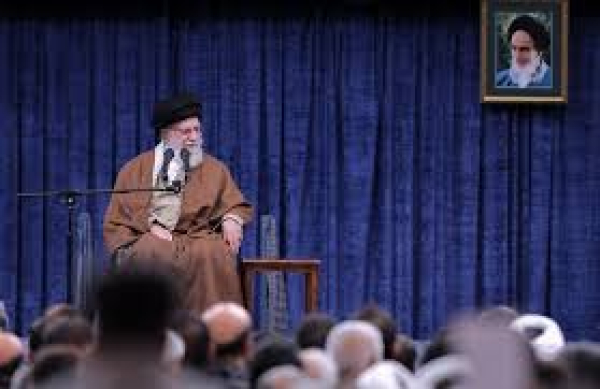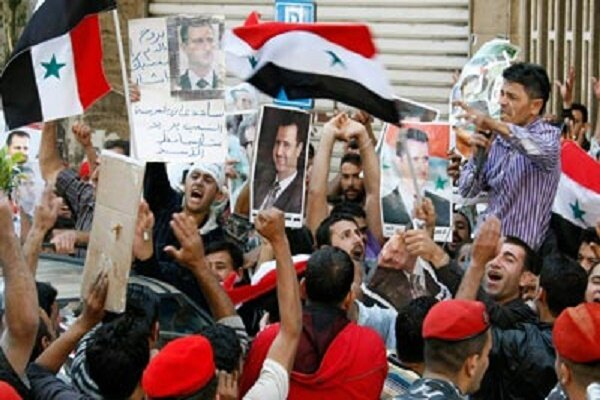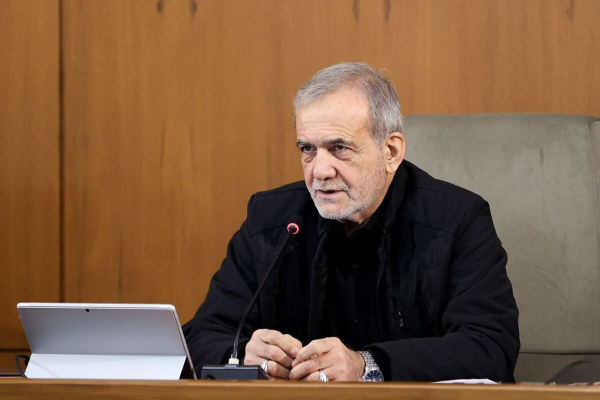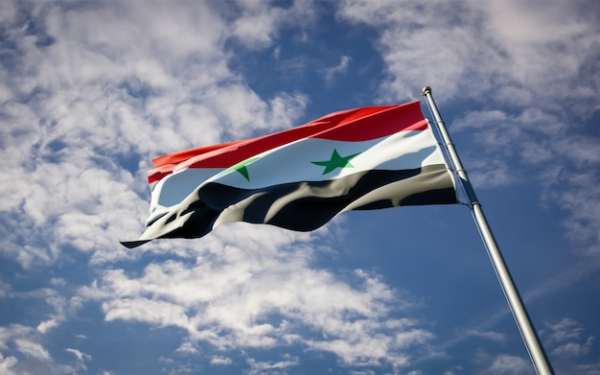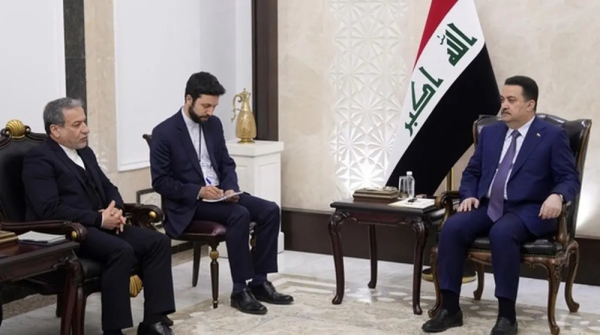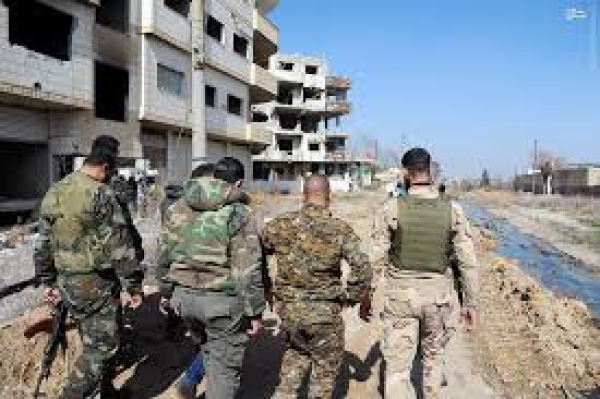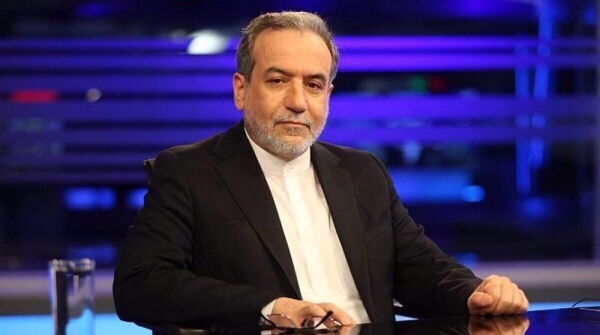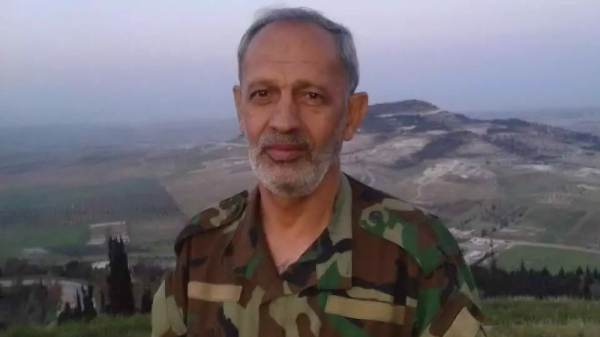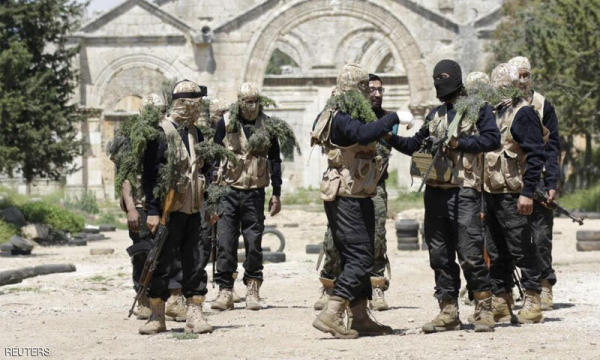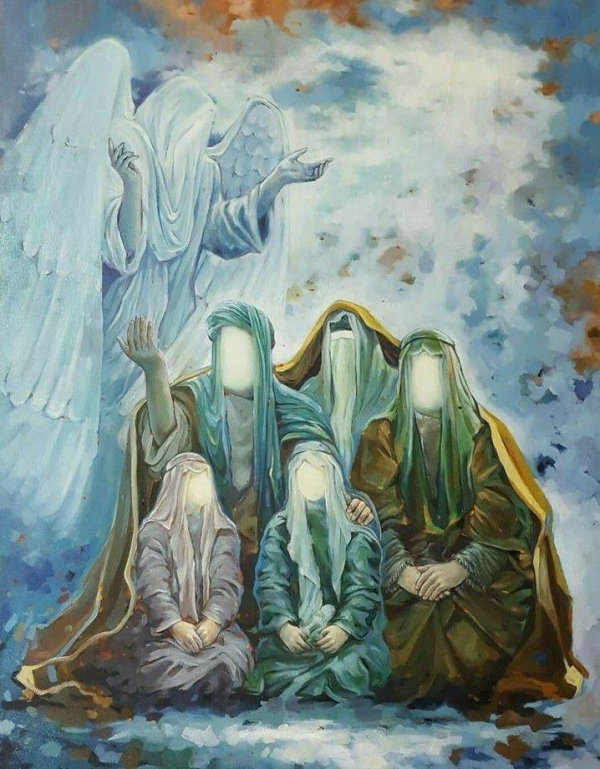zarezadeh
The leader's words about the Syrian crisis create hope for the defeat of Israeli and American conspiracies.
In his first remarks since the fall of Bashar al-Assad’s government in Syria, the Leader of the Islamic Revolution, Ayatollah Seyyed Ali Khamenei, said the events that unfolded in the Arab country over the past week were orchestrated in the command rooms of the United States and the Israeli regime.
The “regime change” plot, long in the making, gained momentum immediately after the Israeli regime agreed to a ceasefire in Lebanon late last month, following its failure to achieve any military objectives after nearly 70 days of unbridled aggression.
Originating from the northwestern city of Aleppo, militant groups led by Hayat Tahrir al-Sham (HTS) made dramatic and stunning advances, ultimately forcing Assad to leave the country on Sunday, bringing his long reign to an end.
“There should be no doubt that what happened in Syria was plotted in the command rooms of the United States and Israel. We have evidence for this," the Leader told the gathering in Tehran on Wednesday.
“One of the neighboring countries of Syria also played a role, but the primary planners are the US and the Zionist regime,” he added, without mentioning the name of the country.
The Americans not only propped up these militant groups over the years to undermine the democratically-elected Assad government but also imposed crippling sanctions designed to weaken Syria’s economy and foment public discontent.
US President Joe Biden described the collapse of Assad’s government as “a fundamental act of justice,” crediting it to the US and its allies, particularly the Israeli regime, for “weakening Syria’s backers.”
“Our approach has shifted the balance of power in the Middle East,” Biden was quoted as saying following a meeting with his national security team on Monday.
Donald Trump, who is set to reoccupy the White House next month, stated on Saturday—one day before the announcement of Assad's fall—that Washington "should have nothing to do" with developments in Syria, literally giving a free hand to HTS militants to swarm the Syrian capital.
"This is not our fight. Let it play out. Do not get involved," he posted on his Truth Social platform.
Documents reveal that the US had tried unsuccessfully for years to overthrow Assad’s government, viewing him as a major obstacle in their efforts to undermine Iran and the Axis of Resistance.
One prominent organization involved in the US’s “regime change” project in Syria is the Syrian Emergency Task Force (SETF), funded by the US Agency for International Development (USAID), a proxy of the Central Intelligence Agency (CIA).
The day after Assad’s government was overthrown, SETF Executive Director Mouaz Moustafa met with US National Security Advisor Jake Sullivan to discuss what he termed the successful completion of the American “mission.”
The Israeli regime, which thrives on chaos and instability, had supported these militant groups for years, working behind the scenes to destabilize Assad’s government in Damascus.
Benjamin Netanyahu’s “victory” speech following Assad’s fall from the occupied Golan Heights underscored the significance of the outgoing government to the resistance front, as viewed by war hawks in Tel Aviv.
With Assad out of the picture, the Israeli regime now has free rein to illegally seize more Syrian territory and launch airstrikes at will, with no opposition or condemnation from the militant factions that have taken control in Damascus.
The US-Israeli “regime change” plot in Syria was supported by some regional countries, as noted by the Leader of the Islamic Revolution. However, the primary architects of the plan remained the US and Israel.
Does Assad’s fall mark the end of the resistance front? Ayatollah Khamenei asserted that the resistance would continue to encompass the entire region more strongly than ever, emphasizing that the Axis of Resistance does not depend on individuals or governments.
It is a dynamic movement that will endure, irrespective of such regional dynamics.
The Press TV Editorial published on Monday highlighted that the resistance has never relied on any individual or entity. Even before Syria became a logistical hub for the resistance, groups like Hezbollah had already established themselves as formidable forces.
“This is resistance, and this is the resistance front,” the Leader declared in his Wednesday remarks. “The more pressure you apply, the stronger it becomes. The more crimes you commit, the more motivated it grows. The more you fight it, the more it expands.”
The Islamic Republic of Iran has steadfastly supported Syria’s government and people all these years, providing ironclad and extensive assistance at the request of Assad’s government.
Iran will continue to stand by Syria, as Iranian top diplomat Abbas Araghchi confirmed on Sunday. He stressed that Syria’s sovereignty and territorial integrity must be respected and that its destiny should be determined by its own people, not external powers.
Addressing concerns about the impact of Assad’s fall on Iran, Ayatollah Khamenei reassured: “With the help of God, Iran is strong and powerful and will only grow more powerful.”
He said Iran had informed Assad months ago about the advancing militant movements, corroborating recent official reports, and added that the new current in Syria would not last long.
In a recent television interview, Araghchi hinted that Iran had offered assistance to Syria’s military to repel the militant offensive but noted that the Syrian armed forces were unable to mount an effective resistance themselves.
Leader of the Islamic Revolution said when the Syrian Arab Army failed to resist the militant offensives; Iran’s direct involvement in the battle became untenable.
The ongoing debate about the longevity of HTS-led militant groups and the stability of the new ruling entity highlights the multifaceted challenges they face, both internally and externally. These challenges do not augur well for their short-term or long-term future.
“With divine grace, the occupied regions of Syria will be liberated by the courageous youth of Syria. Do not doubt that this will happen, and the US will also be expelled from the region by the resistance front,” Ayatollah Khamenei remarked in his Wednesday speech.
Leader of the Islamic Revolution also discussed the differing goals of various parties currently active in Syria. Some aim to occupy territories in the north and south, while the US seeks to establish a foothold in the region.
“Time will show that none of them will achieve these goals,” he asserted.
Ayatollah Khamenei further addressed the threat posed by the Daesh terrorist group, describing it as a “bomb of insecurity” intended to destabilize Syria, Iran, and the entire region, with Iran being the ultimate target.
He credited the efforts of Iranian forces under the leadership of top anti-terror commander General Qassem Soleimani for protecting holy sites, restoring security, and halting the alarming spread of terrorism beyond Iraq and Syria.
“They organized, armed, and prepared local youth, enabling them to stand against Daesh and ultimately break its back,” the Leader said, commending General Soleimani’s role.
“Our military presence in Syria and Iraq was advisory, not a replacement for their armies. Our forces established key command centers, defined strategies, and intervened when necessary. Most importantly, they mobilized local youth,” he added.
The leader of the Islamic Revolution also reminisced about Syria’s historical solidarity with Iran, particularly during the imposed war by the West-backed Saddam Hussein regime in Iraq.
“When almost the entire world was backing Saddam against us, Syria cut off the oil pipeline that transported Iraqi oil to the Mediterranean and Europe, thereby halting Saddam's revenue,” he said.
In the concluding part, the Leader of the Islamic Revolution said the crisis in Syria carries lessons and warnings, one of which is the danger of negligence toward the enemy.
“The enemy acted swiftly, but Syrian officials should have anticipated and prepared for such actions,” he noted, adding that Iranian intelligence agencies had repeatedly warned the Syrian government.
“Whether these warnings reached the higher authorities or were lost somewhere remains unknown, but it’s clear that such negligence can have dire consequences,” he asserted.
“One should never underestimate the enemy or be deceived by their smiles. Often, they speak softly but hide a dagger behind their back, waiting for the right opportunity."
By Press TV Staff Writer
Only the Syrian people should decide the fate of Syria without foreign interference.
To achieve an independent and strong government in Syria, it is necessary to end military conflicts as soon as possible, prevent terrorist acts, and begin a national dialogue with the participation of all segments of Syrian society to form an inclusive government that represents all Syrians.
Syria is an important region for the United States and Israel in terms of location. Therefore, these countries are seeking to establish military bases in this region.
The Syrian people must be careful not to be deceived by foreign enemies and elect their legitimate government with the right reason and logic and not allow foreigners, even Turkey, to interfere in the future of Syria.
Currently, Bashar al-Assad was forced to leave Syria due to political pressures, while Bashar has many supporters in this country. Therefore, the opinion of Bashar al-Assad's supporters must also be taken into account in forming a new government.
Iranian President: Dialogue among all Syrians is essential to achieve consensus
The president made the remarks in an address to a cabinet session on Sunday following the fall of the Syrian government after militant groups led by Hay’at Tahrir al-Sham (HTS) stormed Damascus.
“This is the Syrian people who should make decisions about the country’s future and its political system,” Pezeshkian said.
He stressed the importance of maintaining unity and protecting national sovereignty and territorial integrity in Syria.
He expressed hope that military conflicts and violence would end in Syria as soon as possible “so that the Syrian people will be able to decide their own destiny in a calm atmosphere free from any violence, anxiety or destructive external intervention.”
It is necessary to ensure the security of all Syrian citizens and foreign nationals and protect holy sites and diplomatic and consular premises as per international law, Pezeshkian said.
He added that Iran would continue its diplomatic consultations with all the parties involved and the United Nations to help stabilize the situation in Syria and establish stability and security in the region.
The Iranian president strongly condemned Israel’s aggression against Syrian territory and called on all parties in the Arab country and neighboring nations to remain vigilant against the regime's exploitation of the situation to further its expansionist and illegal goals.
In a statement earlier on Sunday, the Iranian Foreign Ministry said only the Syrian people can make decisions about the country’s fate without any “destructive” foreign meddling.
“The Islamic Republic of Iran closely monitors developments in Syria and the region and will adopt appropriate approaches and positions while taking into account the behavior and performance of influential players in the Syrian political and security scene,” it said.
Press TV’s website
Syria
Syria, officially the Syrian Arab Republic, is a country in Western Asia, located in the eastern Mediterranean and the Levant. It is bordered by the Mediterranean Sea to the west, Turkey to the north, Iraq to the east and southeast, Jordan to the south, and Israel and Lebanon to the southwest. It is a republic consisting of 14 governorates. Damascus is the capital and largest city of Syria. With a population of 25 million in an area of 185,180 square kilometers (71,500 square miles), it is the 57th most populous country and the 87th largest country.
The name "Syria" historically refers to a wider region, generally synonymous with the Levant, known in Arabic as al-Sham. The modern state encompasses the sites of several ancient kingdoms and empires, including the Ibla civilization of the 3rd millennium BC. Damascus and Aleppo are cities of great cultural importance. During the Islamic era, Damascus was the seat of the Umayyad Caliphate and a provincial capital of the Mamluk Empire in Egypt. The modern state of Syria was established in the mid-20th century after centuries of Ottoman rule, as a French mandate. The newly created state represents the largest Arab state, emerging from the provinces of Syria previously under Ottoman rule. In 1945, the new republic gained legal independence as a parliamentary republic, a move that legally ended the former French mandate. French forces withdrew in April 1946, granting it de facto independence.
The post-independence period was turbulent, with several military coups rocking the country between 1949 and 1971. In 1958, Syria entered into a short-lived union with Egypt, which ended in a 1961 coup and was renamed the Arab Republic. Syria established a one-party state in a 1963 coup constitutional referendum led by the Baath Party's military committee, and ruled Syria under emergency law from 1963 to 2011, effectively suspending constitutional protections for citizens. Internal power struggles within the Baathist factions led to further coups in 1966 and 1970, ultimately leading to the seizure of power by Hafez al-Assad. He effectively established an Alawite minority government to consolidate power in his family. After Assad's death, his son Bashar al-Assad inherited the presidency in 2000. Since the Arab Spring in 2011, Syria has been embroiled in a multi-party civil war with the involvement of various countries, leading to a refugee crisis in which more than 6 million people have been displaced from the country. In 2014-2015, in response, the United States launched an international coalition that defeated ISIS territorially in Syria. Since then, three political entities - the Syrian Interim Government, the Syrian Salvation Government, and Rojava - have emerged on Syrian soil to challenge Assad's rule.
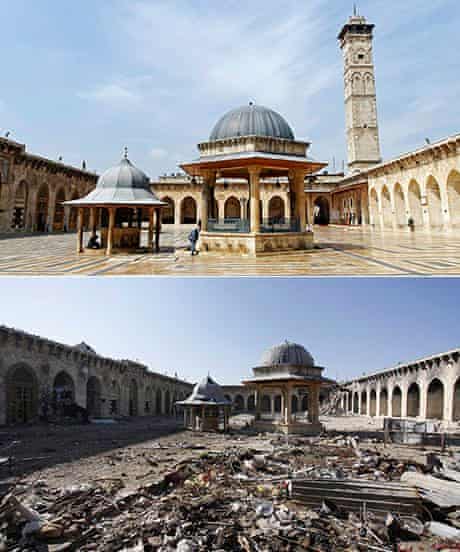 Syria is a country of fertile plains, high mountains and deserts, home to a diverse range of ethnic and religious groups. Arabs are the largest ethnic group and Sunni Muslims are the largest religious group. It is now the only country ruled by neo-Baathists who advocate socialism and Arab nationalism. The country’s current Baathist government is a totalitarian dictatorship with an all-encompassing personality cult around the Assad family and has drawn widespread criticism for its severe internal repression and war crimes.
Syria is a country of fertile plains, high mountains and deserts, home to a diverse range of ethnic and religious groups. Arabs are the largest ethnic group and Sunni Muslims are the largest religious group. It is now the only country ruled by neo-Baathists who advocate socialism and Arab nationalism. The country’s current Baathist government is a totalitarian dictatorship with an all-encompassing personality cult around the Assad family and has drawn widespread criticism for its severe internal repression and war crimes.
Syria is ranked fourth worst on the list of fragile states. Hypocrites and foreign enemies have caused the unity among the Syrian people to crumble. Meanwhile, ISIS, with the help of Turkey, invaded the country and managed to take over some of the country. Meanwhile, soldiers from Iraq and Iran are fighting ISIS terrorists.
Iran warns that the threat from armed groups is "not limited to Syria," according to Neighbors at Risk.
Iranian Foreign Minister Abbas Araghchi says the threat of armed groups active in Syria will not be limited to the country and will spread to Iraq, Jordan, and Turkey.
Araghchi was speaking in a joint press conference with his Iraqi and Syrian counterparts Fuad Hussein and Bassam Sabbagh in Baghdad on Friday.
If Syria becomes a safe haven for terrorists and the ground is prepared for the return of terrorist groups, including Daesh, this will pose a major threat to the entire region, he warned.
Pointing to three messages of the tripartite meeting in Baghdad, he said, “The first message is to support the Syrian government and people in the fight against Takfiri terrorist groups.”
He expressed confidence that Takfiri terrorist groups are carrying out their attacks as part of an American-Zionist plot, emphasizing, “The role of the Zionists in designing this conspiracy should not be overlooked.”
The top Iranian diplomat once again warned that terrorism knows no bounds, saying the fight against the scourge should not be limited to borders.
“In order to protect our own security, we must support the security of our neighbors in the fight against terrorism,” he pointed out.
He urged a non-discriminatory fight against terrorism, saying the Hayat Tahrir al-Sham (HTS) and the Nusra Front have been designated as a terrorist group by the United Nations.
Syria has been gripped by foreign-sponsored militancy since March 2011, with Damascus saying the Western states and their regional allies are aiding terrorist groups to wreak havoc in the Arab country.
The Hayat Tahrir al-Sham armed group launched a large-scale attack in Aleppo and Idlib provinces in the northwest of Syria on November 27, seizing several areas. Since then, the Syrian government forces have been engaged in fierce clashes to regain ground.
As terror victim, Iraq will continue to fight terrorism: Hussein
The Iraqi foreign minister condemned the ongoing attacks in Syria by terrorists who are listed as a terrorist group by the UN.
Hussein said his country has been a victim of terrorism and will continue to fight it.
He added that security of Iraq links to security in Syria and other neighboring countries.
Hussein underscored the importance of preventing the spread of war and terrorist attacks to his country, saying the Iraqi armed and security forces as well as fighters of the resistance movement Hashd al-Shaabi and Kurdish Peshmerga are fully prepared to protect the country’s territory and people.
Syrian army fulfilling duties in anti-terror fight: Sabbagh
Sabbagh said the Syrian army is conducting its duties to fight terrorist groups, adding that the moves by terrorist groups have displaced a portion of his country’s people.
The Syrian foreign minister added that supporters of the terrorist groups have violated resolutions of the United Nations and Security Council as well as the agreements of the Astana peace process.
He emphasized that dangerous terrorist threats are not threatening only Syrian security but endanger security of the entire region,
He called for regional and international efforts to combat terrorist groups.
Press TV’s website
The increase in terrorism in Syria is part of the US-Israeli conspiracy
The invasion of foreign-backed Takfiri terrorists in Syria is the first step in a dangerous scenario for the region, he said: The coincidence of this invasion with a fragile ceasefire in Lebanon indicates a coordinated American-Zionist conspiracy to weaken Syria, its allies and the axis of resistance.
Foreign-backed terrorists led by the Takfiri group "Hayat Tahrir al-Shams" launched a massive offensive in the provinces of Aleppo and Idlib in northwestern Syria on November 27 and captured several areas.
Since then, Syrian government forces have been engaged in fierce clashes with terrorists to retake their positions.
The terrorist groups seek to prevent the Syrian government's efforts to consolidate security and stability in the country, which is also under regular Israeli aggression.
Israel has been the main sponsor of terrorist groups opposing the democratically elected government of President Assad since the foreign-backed militants began in Syria in March 2011.
Russia, alongside Iran, has been assisting Syrian forces in battles across the country, mainly by providing air support for ground operations.
Iran ready to consider troop deployment to Syria upon official request
In an interview with the Qatari-owned news outlet New Arab, Araghchi warned that the surprise offensive by terrorist groups in northwestern Syria could pose a more serious security threat to neighboring countries, such as Turkey and Iraq, than to Iran.
He expressed his concerns about the potential collapse of the Astana process, a diplomatic initiative that began in 2017 and involves three main guarantor states: Russia, Turkey, and Iran.
The Astana process was established to facilitate dialogue and negotiations aimed at resolving the Syrian conflict, but its effectiveness has come under scrutiny as terrorist violence continues to escalate.
Under this initiative, the three countries committed to preventing a resurgence of militancy in Syria. However, the recent surge in terrorist activities has led to criticism of Turkey, a primary supporter of foreign-backed militancy in Syria since 2011, for failing to uphold its obligations.
Araghchi also discussed his recent visit to Ankara, noting that Tehran consistently seeks consultation and dialogue with Turkey regarding their differences. He said there are ongoing preparations aimed at calming the situation in Syria and creating opportunities for a lasting resolution.
On Iran’s relationships with allies in the Axis of Resistance, Araghchi stated that "Iran does not command resistance factions in Arab countries and does not have organizational ties with them; rather, it supports their cause and provides assistance when necessary."
Regarding the possibility of an agreement to halt the Israeli campaign of genocide in Gaza, Araghchi said "if Israel enters negotiations with Hamas for a ceasefire and the release of captives, it would signify Israel's defeat."
On Iranian relations with Saudi Arabia, he indicated that they are progressing positively but emphasized that these relations are distinct from those between Tehran and Washington. Concerning Iran's negotiations with Europe regarding its peaceful nuclear program, Araghchi expressed "many reasons for pessimism" about these discussions.
He said Iran currently has no intention of engaging in dialogue with Washington due to a lack of basis for such discussions.
"We are waiting to see how the new administration will shape its policies; then we will formulate our own policy."
Press TV’s website
Iranians bid farewell to senior adviser to the Islamic Revolutionary Guard Corps who was martyred in a terrorist attack in Syria.
Iranians attended the funeral of a senior adviser to the Islamic Revolutionary Guard Corps who was martyred following a massive attack by foreign-backed Takfiri terrorists on government-controlled positions in the northwestern Syrian province of Aleppo.
Mourners carried the coffin of Brigadier General Kiomars Poureshmi with the Iranian flag on Saturday morning.
The ceremony was also attended by high-ranking military commanders and government officials.
He, who was one of the defenders of the shrine of Hazrat Zaynab (PBUH) and one of the senior military advisers to the IRGC in Syria, was martyred in the Takfiri attacks. Terrorists in the outskirts of Aleppo
At the request of Damascus, Iran has an advisory mission in Syria to help the war-torn Arab country defeat foreign-backed militants who have been fighting the Syrian government since 2011. Iran is trying to restore security to the region with the help of the Syrian government.
The revival of terrorism in Syria is an "American-Zionist conspiracy" after the defeat in Lebanon.
Iranian Foreign Minister Abbas Araqchi and his Syrian counterpart Bassam Al-Sabbagh
Iranian Foreign Minister Abbas Araqchi described the revival of Takfiri terrorism in northern Syria as the result of an American-Israeli project, noting: This development follows the Israeli regime's defeats against the resistance in Lebanon and the Palestinian territories.
Araqchi described this undesirable development as an "American-Zionist design" that led to the Israeli regime's defeat of the resistance movements in Lebanon and throughout the Palestinian territories.
These are the words that the official made on Thursday in a phone call with his Lebanese counterpart Abdullah Bouhabib, during which he called this phenomenon an American-Israeli scenario aimed at destabilizing West Asia following the Zionist regime's failures in confronting the Lebanese Hezbollah resistance. Movement
Araqchi also stressed that the threat of terrorism has been effectively countered by the Arab country.
Iran continues to support Syria in the fight against terrorism
Iraqchi stressed the Islamic Republic's continued support for the Syrian government, nation and army in the fight against terrorism and maintaining regional security and stability.
The remarks reflected Tehran's action as the first country to rush to support the Arab nation in 2014, when terrorism and foreign-backed militants swept across large parts of the country.
However, Damascus, with the help of its allies, was able to gradually reverse the tide and regain lost territory and defeat ISIS, the most brutal terrorist group, in 2017.
Sabbagh also reported on the situation on the ground in northern Syria after the terrorist attacks.
He stressed that the Syrian government and people have stood up to terrorist aggression with all their might and will continue to prevent the realization of the sinister ambitions of terrorists and their supporters.
It has been reported that members of the Takfiri terrorist group Hayat Tahrir al-Sham (HTS) have captured many areas under government control and killed dozens of Syrian soldiers in the north of the Arab country.
However, the Lebanese Al-Mayadeen TV channel later announced that the Syrian army had thwarted a large-scale terrorist operation in Aleppo province with a preemptive strike.
According to the channel, four major terrorist operations that were supposed to start from the city of Anadan, 12 kilometers northwest of Aleppo, were thwarted before they could begin.
According to the report, the army launched heavy missile attacks on terrorist positions from villages west of Aleppo to Mount Zawia, south of the city of Idlib in the neighboring province.
It is also said that the Syrian army has stopped the advance of terrorists led by Hayat Tahrir al-Sham in southeast Idlib and has launched a counterattack to retake their positions.
A Beautiful Lesson from the Epic Life of the Ahlul Bayt
Give to others what you love for yourself, even when you may need it yourself.
“And they feed the poor and the orphan and the captive, [saying] We feed you only for the sake of Allah. We ask of you no reward, nor thanks.” (76:8-9).
Throughout her life, Fatimah prioritized the needs of others over her own. This verse was revealed when Fatimah Zahra and Imam Ali (peace be upon them) (and some narrations their slave girl Fida and Imam Hassan (peace be upon them) and Hussein (peace be upon them)) fasted for three days after Allah cured Imam Hassan and Hussein from their illness.
Every night a needy person would come to her door asking for food, and every night she would give what she had to the hungry.
On another occasion, on the day of her wedding, Fatimah (peace be upon her) donated her wedding dress to a needy woman. They say that this verse is in response to their question: "You will never attain piety until you spend from what you love." [3:92]
